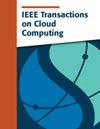Robin: An Efficient Hierarchical Federated Learning Framework via a Learning-Based Synchronization Scheme
IF 5
2区 计算机科学
Q1 COMPUTER SCIENCE, INFORMATION SYSTEMS
引用次数: 0
Abstract
Hierarchical federated learning (HFL) extends traditional federated learning by introducing a cloud-edge-device framework to enhance scalability. However, the challenge of determining when devices and edges should aggregate models remains unresolved, making the design of an effective synchronization scheme crucial. Additionally, the heterogeneity in computing and communication capabilities, coupled with non-independent and identically distributed (non-IID) data distributions, makes synchronization particularly complex. In this article, we proposeRobin:基于学习同步方案的高效分层联邦学习框架
分层联邦学习(HFL)通过引入云边缘设备框架来增强可伸缩性,从而扩展了传统的联邦学习。然而,确定设备和边缘何时应该聚合模型的挑战仍然没有解决,这使得设计有效的同步方案至关重要。此外,计算和通信能力的异构性,加上非独立和同分布(non-IID)数据分布,使得同步变得特别复杂。在本文中,我们提出了一种基于学习的HFL系统同步方案Robin。通过收集模型参数、CPU使用率、通信时间等数据,设计了一种基于深度强化学习的方法,分别确定云聚合和边缘聚合的频率。该方案充分考虑了设备异构性、非iid数据和设备移动性,在最小化能量开销的同时最大限度地提高了训练模型的准确性。同时证明了Robin同步方案的收敛性。搭建了HFL测试平台,利用树莓派和阿里云的真实数据进行实验。在各种设置下进行了大量的实验,验证了Robin的有效性,模型精度提高了31.2%,能耗降低了36.4%。
本文章由计算机程序翻译,如有差异,请以英文原文为准。
求助全文
约1分钟内获得全文
求助全文
来源期刊

IEEE Transactions on Cloud Computing
Computer Science-Software
CiteScore
9.40
自引率
6.20%
发文量
167
期刊介绍:
The IEEE Transactions on Cloud Computing (TCC) is dedicated to the multidisciplinary field of cloud computing. It is committed to the publication of articles that present innovative research ideas, application results, and case studies in cloud computing, focusing on key technical issues related to theory, algorithms, systems, applications, and performance.
 求助内容:
求助内容: 应助结果提醒方式:
应助结果提醒方式:


